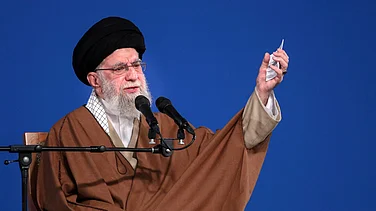South Korea launched its first military spy satellite into space Friday, a little over a week after North Korea claimed to put its own spy satellite into orbit for the first time as tensions rise between the rivals.
Launched from California's Vandenberg Space Force Base using SpaceX's Falcon 9 rocket, it was the first of five spy satellites South Korea plans to send into space by 2025 under a contract with SpaceX. The event had been scheduled for earlier in the week but was pushed back because of weather conditions.
South Korea had no military reconnaissance satellites of its own in space and has partially resorted to the United States' spy satellites to monitor moves by North Korea.
South Korea's Defense Ministry described the launch as successful, saying the satellite had a communication with an overseas ground station.
A ministry statement said the launch allowed the South Korean military to acquire an independent spaced-based surveillance system. It said the satellite would also help bolster the military's preemptive missile strike capability, a key part of its so-called three-axis system that includes missile defense and massive retaliatory capabilities.
After two launch failures earlier this year, North Korea said it successfully placed its Malligyong-1 spy satellite into orbit last week. South Korea confirmed that the satellite entered orbit, but officials said they need more time to verify whether it is working properly.
North Korea said Tuesday that leader Kim Jong Un reviewed imagery taken by the Malligyong-1 satellite of the White House and the Pentagon in Washington, and U.S. aircraft carriers at a navy base and a shipyard in Virginia. North Korea earlier said the satellite also transmitted photos of U.S. military facilities in Guam and Hawaii and key sites in South Korea.
North Korea hasn't yet released those photos. Outside experts remain skeptical about whether its satellite can send high-resolution imagery and perform proper military reconnaissance.
The North Korean satellite launch sparked immediate, strong condemnations from the U.S., South Korea and others. Multiple United Nations Security Council resolutions ban any satellite launches by North Korea, viewing them as covers for testing its long-range missile technology.
North Korea responded angrily, saying it has sovereign rights to launch spy satellites to cope with what it calls increasing U.S. hostilities. It said it would also launch additional ones.
“The main threat to international peace and security does not come from the exercise of (North Korea's) sovereign right but from the U.S. high-handed and arbitrary practices to disturb and oppress it,” Kim Yo Jong, the influential sister of North Korean leader Kim Jong Un, said in a statement Thursday.
The satellite launches have inflamed animosities between the two Koreas, with the rivals taking steps to breach a previous military agreement meant to ease front-line military tensions.
Spy satellites are among the high-tech weapons systems that Kim Jong Un has publicly vowed to introduce. Since 2022, North Korea has conducted about 100 ballistic missile tests — part of efforts to modernize its arsenal of weapons targeting South Korea and the United States.
In response, South Korea and the U.S. have expanded their military training and enhanced “regular visibility” of U.S. strategic assets, including aircraft carriers, nuclear-capable bombers and a nuclear-armed submarine in the Korean Peninsula.
South Korea's spy agency told lawmakers last week that Russia's technological assistance likely enabled North Korea to place its spy satellite into orbit. South Korea, the U.S. and Japan have accused North Korea of seeking high-tech Russian technologies needed to enhance its military programs in return for supplying conventional arms to support Russia's war in Ukraine. Both Russia and North Korea have denied the allegations.





















